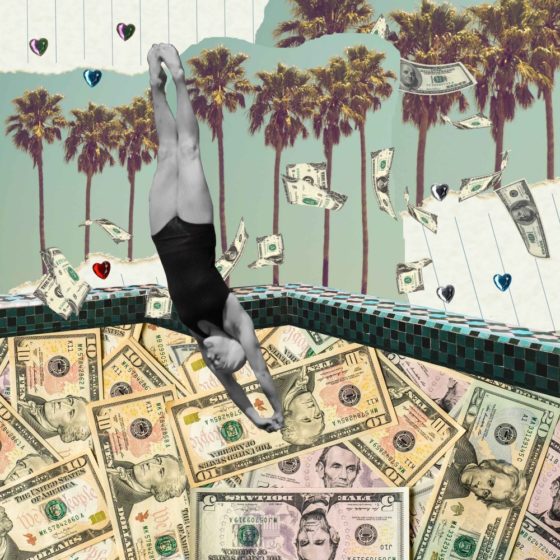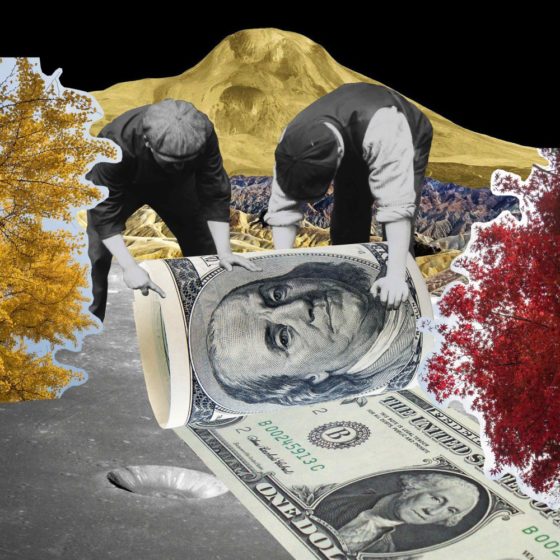The 2nd of the month was a date I dreaded.
Because, by the 2nd of the month, I’d normally have spent my entire salary.
I might not need, or even particularly want anything, but without fail, I would find myself wandering around H&M, Topshop – simultaneously browsing ASOS, looking for something to buy. And, I would always find something. A fleeting moment of joy tinged with guilt as I racked up boots, dresses and duvet covers. They’d be stuffed under my bed, along with my credit card statements that I couldn’t bear to look at.
Cards on the table? My relationship with money has always been piss poor. From the second I was given an overdraft, I spent into it. I always covered my rent and bills, but anything else was instantly spent on payday, leaving me broke from the 2nd of the month.
I knew I was spending money that I didn’t have, but I couldn’t seem to stop myself. Nor, could I speak to anyone about it.
There was something so embarrassing about walking around with £3,000 of debt and seemingly nothing to show for it. A chilling irony in the fact that I had to walk to work the last week of the month because I couldn’t afford a travel card, yet I had a wardrobe that took up 90% of my tiny bedroom.
It got to a point where my boyfriend sat me down and explained that he was nervous about the future, about our future.
Joint bank accounts that I would run to nothing, a mortgage with my terrible credit score, scary letters ignored on a daily basis. Maybe it was the fact that he’s an accountant or a careful spender, but it made me realise that I needed to make changes, for both of us.
So, I opened each letter that I’d chucked under my bed, seeing the true extent of my spending. I started checking my account regularly and asked my boyfriend to help me budget. I got a Monzo card and started clearing each account one by one.
But, solving my immediate debt problem didn’t answer my question. How did I get here?
I started with Rebecca Lockwood – NLP (Neuro-Linguistic Programming) Specialist. “It starts early on. From a very young age, we’re taught that purchasing is a reward, something to be excited about. We form pathways in our brain that link certain events together. And shopping is one of those events.”
Rebecca specialises in coaching women to help them improve their relationships with work or money. “Essentially, we’re bombarded by advertising, everywhere we look and whilst some spending habits are reflective of low self-esteem, a lot are habits. Debt is a vicious cycle, the panic causes you to spend and spending creates the guilt, that in turn, causes you to spend again.”
So, how do you fix it?
“You have to almost rewire your pathways and acknowledge the fact that spending is almost a knee-jerk response. We’re taught from a young age that ‘new’ is a reward, something to celebrate. In fact, it’s so ingrained in our culture that we treat it as a form of self-care, dubbing it retail-therapy.”
Rebecca also highlighted the links to low self-esteem and the feeling that something new, can make us feel different, even if only for a short amount of time. And, it’s something I know far too well.
I also reached out to Emilie Bellet, author of ‘You’re not broke – You’re pre-rich’. With a mass of experience in helping young women manage their money, Emilie understands this problem far too well.
“We all know that feeling of wanting – ‘deserving’ – a treat at the end of a challenging day or week. It can be quite helpful to look at our spending and see what are our ‘wants’ versus our ‘needs’. We buy things we don’t need, ‘want’ when we think that we could feel better or look better.’
Emilie suggested that we need to stop making ‘treats’ forbidden in the first place. “If you know you’re going to do it anyway, factor in a monthly amount for impulse spending. You could also try following the 10/10 rule: if an item costs more than £10, spend 10 minutes thinking about it. If after that time you’re still not sure whether to buy it, put it back on the shelf.”
Ready to look your debt in the eye?
Emilie suggests asking yourself a few key questions. Is your debt becoming a problem? Unsure whether you can keep up with your payments for your mortgage, rent, energy bills? Are you paying only the minimum balance on your credit cards? Do you feel you are losing control or feeling trapped by your money worries?
Managing debt is hard and it can become a massive psychological burden, especially as it feels as though you are completely on your own.
Receiving endless payment reminders and watching the totals mount up would test the optimism in any of us because we process the situation as a sign of personal failure rather than as a problem we can solve. Many will start to push the problem out of sight and avoid opening those angry-looking envelopes.
There is still a lot of shame associated with battling debt and it remains a bit of a taboo topic to bring up. As a society, we are very limited in the way we talk about money and the emotional toll that worries and debt can take on professional self-esteem and mental health.
Most debt problems can be solved with a strong plan in place.
By approaching repayments methodically, clear-sighted (that is, not being in denial) and with a do-able repayment plan, you will gradually get out of debt. It might take a while but you will feel so much better, and more in control, knowing that every day you are getting closer to your goal. It may take time, but you will gradually stop making the common mistakes that can actually increase the amount you have to repay too.
It seems that knowledge is, quite literally, wealth. And to become better with money, the first step is education.
If you’re really struggling to repay your debt, contact StepChange (stepchange.org) or Citizens Advice (citizensadvice.org.uk), who can give advice and help you create a repayment plan for you.
Words by Charlotte Moore









